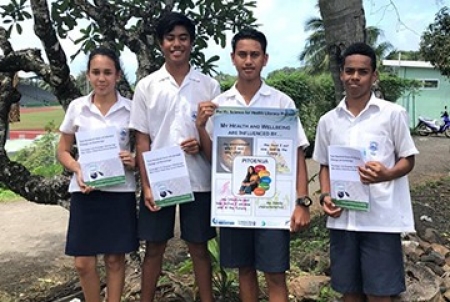High schools on Rarotonga are empowering students to meet the challenge of non-communicable disease risk. A recent Cook Islands News article (16 November 2017) highlighted the non-communicable disease (NCD) prevention programmes underway at Tereora College on Rarotonga, with a particular focus on newly published resources that have been introduced into the Year 9 social science programme.
The 200 Years of Lifestyle Change on Rarotonga - Tauianga o te Oraanga i Rarotonga Nei i Roto i Tatai Rua Anere Mataiti student resource book was written by Celeste Barrett-Watson (Head of Faculty for Social Sciences, Tereora College) and Dr Jacquie Bay (Liggins Institute) and adds to the list of resources already created specifically for Year 9 and 11 students in the Cook Islands.
See the full Cook Islands News article here.
Tereora College is one of three colleges in the Cook Islands that has been taking part in the Pacific Science for Health Literacy Project (PSHLP) pilot programme, a school-science-community partnership supporting young people to build science and health literacy, develop a stronger understanding of the issues facing their community, and to make healthy choices about their future.
The PSHLP is a collaboration between the Cook Islands Ministries of Education and Health, and the Liggins Institute at the University of Auckland that has been working with high schools on Rarotonga to empower students to investigate issues around non-communicable diseases (NCDs) through a cross-curricular, multi-sectoral programme focused specifically on the Cook Islands.
The PSHLP is an NZAid-funded project that has been underway in the Cook Islands since 2013, and Tonga since 2014.





